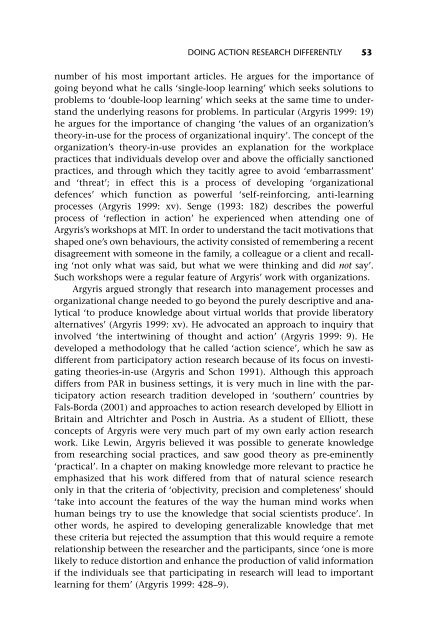Action Research A Methodology for Change and Development
Action Research A Methodology for Change and Development
Action Research A Methodology for Change and Development
You also want an ePaper? Increase the reach of your titles
YUMPU automatically turns print PDFs into web optimized ePapers that Google loves.
DOING ACTION RESEARCH DIFFERENTLY 53<br />
number of his most important articles. He argues <strong>for</strong> the importance of<br />
going beyond what he calls ‘single-loop learning’ which seeks solutions to<br />
problems to ‘double-loop learning’ which seeks at the same time to underst<strong>and</strong><br />
the underlying reasons <strong>for</strong> problems. In particular (Argyris 1999: 19)<br />
he argues <strong>for</strong> the importance of changing ‘the values of an organization’s<br />
theory-in-use <strong>for</strong> the process of organizational inquiry’. The concept of the<br />
organization’s theory-in-use provides an explanation <strong>for</strong> the workplace<br />
practices that individuals develop over <strong>and</strong> above the officially sanctioned<br />
practices, <strong>and</strong> through which they tacitly agree to avoid ‘embarrassment’<br />
<strong>and</strong> ‘threat’; in effect this is a process of developing ‘organizational<br />
defences’ which function as powerful ‘self-rein<strong>for</strong>cing, anti-learning<br />
processes (Argyris 1999: xv). Senge (1993: 182) describes the powerful<br />
process of ‘reflection in action’ he experienced when attending one of<br />
Argyris’s workshops at MIT. In order to underst<strong>and</strong> the tacit motivations that<br />
shaped one’s own behaviours, the activity consisted of remembering a recent<br />
disagreement with someone in the family, a colleague or a client <strong>and</strong> recalling<br />
‘not only what was said, but what we were thinking <strong>and</strong> did not say’.<br />
Such workshops were a regular feature of Argyris’ work with organizations.<br />
Argyris argued strongly that research into management processes <strong>and</strong><br />
organizational change needed to go beyond the purely descriptive <strong>and</strong> analytical<br />
‘to produce knowledge about virtual worlds that provide liberatory<br />
alternatives’ (Argyris 1999: xv). He advocated an approach to inquiry that<br />
involved ‘the intertwining of thought <strong>and</strong> action’ (Argyris 1999: 9). He<br />
developed a methodology that he called ‘action science’, which he saw as<br />
different from participatory action research because of its focus on investigating<br />
theories-in-use (Argyris <strong>and</strong> Schon 1991). Although this approach<br />
differs from PAR in business settings, it is very much in line with the participatory<br />
action research tradition developed in ‘southern’ countries by<br />
Fals-Borda (2001) <strong>and</strong> approaches to action research developed by Elliott in<br />
Britain <strong>and</strong> Altrichter <strong>and</strong> Posch in Austria. As a student of Elliott, these<br />
concepts of Argyris were very much part of my own early action research<br />
work. Like Lewin, Argyris believed it was possible to generate knowledge<br />
from researching social practices, <strong>and</strong> saw good theory as pre-eminently<br />
‘practical’. In a chapter on making knowledge more relevant to practice he<br />
emphasized that his work differed from that of natural science research<br />
only in that the criteria of ‘objectivity, precision <strong>and</strong> completeness’ should<br />
‘take into account the features of the way the human mind works when<br />
human beings try to use the knowledge that social scientists produce’. In<br />
other words, he aspired to developing generalizable knowledge that met<br />
these criteria but rejected the assumption that this would require a remote<br />
relationship between the researcher <strong>and</strong> the participants, since ‘one is more<br />
likely to reduce distortion <strong>and</strong> enhance the production of valid in<strong>for</strong>mation<br />
if the individuals see that participating in research will lead to important<br />
learning <strong>for</strong> them’ (Argyris 1999: 428–9).

















